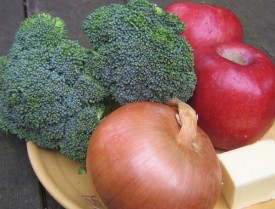Quercetin for Histamine Intolerance

Quercetin, a type of plant-based chemical or phytochemical known as a flavonoid, is highly beneficial for histamine intolerance sufferers. Quercetin reduces the release of histamine, the substance that triggers allergies. Histamine is produced by mast cells.
In allergic rhinitis, mast cells in the nasal area increase in number and are thought to play an important role in the nasal symptoms that occur during seasonal allergies. In one study, researchers triggered histamine release in nasal scrapings from seasonal allergy patients exposed to mite antigen. When the nasal scrapings were exposed to quercetin, histamine release was inhibited 46 percent to 96 percent.[6] In another study of rat mast cells exposed to an allergen, quercetin inhibited histamine release by 95 percent and 97 percent. [7]
Other Health Benefits
Quercetin has been linked to a number of other health benefits. Scientific research proves that not only does it possess potent antioxidant and anti-inflammatory properties [1], it also exerts a cognitive enhancing effect on the brains of Parkinson’s Disease patients [2] and protects against cadmium-induced oxidative toxicity and therefore may ameliorate autism symptoms [3].
‘Particularly notable was a study conducted by researchers at the Institute of Food Research and published in the journal Atheroscleroisis in 2008, which addresses concerns that, while quercetin has been shown to be highly effective in laboratory experiments on cell lines, the antioxidant quickly breaks down in the stomach and intestines when ingested as part of the diet. Quercetin skeptics had suggested that, because of this quick breakdown, quercetin naturally consumed in foods such as apples would have little or no health benefit.
‘The 2008 study showed, however, that both quercetin and the metabolites produced when it breaks down in the digestive system act as anti-inflammatories on the cells of human blood vessels. This suggests that dietary quercetin would indeed have the heart and blood pressure-promoting health benefits that had been observed in laboratory studies.
‘Another study, published in the American Journal of Epidemiology, found that a high dietary intake of flavanols decreases the risk of pancreatic cancer by 25 percent in non-smokers and by more than 50 percent in smokers. When the researchers examined dietary intake of quercetin in isolation, rather than intake of flavanols in general, they still found a reduction in the risk of pancreatic cancer.’ [3]
One clinical study of people with a strong inherited tendency to develop colorectal cancer found that the combination of quercetin and curcumin supplements decreased the number and size of precancerous rectal tumors. [4] No other clinical trials testing quercetin’s ability to prevent or treat cancer have been reported in the medical literature. Clinical trials are needed to further clarify quercetin’s possible benefits. In addition to cancer prevention and treatment, preliminary studies have also suggested potential value for quercetin in prostatitis (inflamed prostate) and heart disease. Further studies are needed before any recommendations can be made. [5]
Food Sources of Quercetin
Good sources for HIT sufferers include apples (particularly apple skin), onions, broccoli, green beans, leafy green vegetables such as lettuce; celery, chives, coriander and dill. One tree ripened apple, for example, contains 50 mg of quercetin. Quercetin is also available as a dietary supplement.
Quercetin is not destroyed by most cooking methods, including frying and baking. It is however lost by boiling food in water. ‘The boiling of onion leads to about 30% loss of quercetin glycosides, which transfers to the boiling water.’ [8]
Further reading
References
[1]‘Quercetin-induced cardioprotection against doxorubicin cytotoxicity.’
Jing-Yi Chen, Ren-Yu Hu and Hsiu-Chuan Chou
Department of Applied Science, National Hsinchu University of Education, Hsinchu, Taiwan
Journal of Biomedical Science 2013, 20:95 doi:10.1186/1423-0127-20-95
[2] Napatr Sriraksa, Jintanaporn Wattanathorn, Supaporn Muchimapura, Somsak Tiamkao, Kamoltip Brown, and Kowit Chaisiwamongkol, “Cognitive-Enhancing Effect of Quercetin in a Rat Model of Parkinson’s Disease Induced by 6-Hydroxydopamine,” Evidence-Based Complementary and Alternative Medicine, vol. 2012, Article ID 823206, 9 pages, 2012. doi:10.1155/2012/823206
[3] Quercetin protects against cadmium-induced oxidative toxicity
Sunday, October 20, 2013 by: David Gutierrez, staff writer, Natural News
‘The common antioxidant quercetin may counter the toxic effects of cadmium on the body, according to a study conducted by researchers from Zhejiang University in China and published in the journal Anatomical Record in 2010. Cadmium is a highly dangerous and widespread heavy metal that has been linked to cancer, impaired brain function and development and damage to organs including the lungs, kidneys and bones. According to a groundbreaking study by Arizona State University researchers that was published in the journal Biological Trace Element Research earlier this year, high blood levels of cadmium are one of the single strongest factors linked to the severity of autism symptoms. The Center for Disease Control and Prevention (CDC) lists cadmium as number seven among the 275 most hazardous substances.’
[4] Cruz-Correa M, Shoskes DA, Sanchez P, et al. Combination treatment with curcumin and quercetin of adenomas in familial adenomatous polyposis. Clinical Gastroenterology & Hepatology.2006;4:1035-1038.
[5] American Cancer Society ‘Quercetin’ Online article accessed 30/06/14
[6] Otsuka H, Inaba M, Fujikura T, Kunitomo M. Histochemical and functional characteristics of metachromatic cells in the nasal epithelium in allergic rhinitis: studies of nasal scrapings and their dispersed cells. J Allergy Clin Immunol 1995, Oct;96(4):528-36.
[7] Haggag EG, Abou-Moustafa MA, Boucher W, Theoharides TC. The effect of a herbal water-extract on histamine release from mast cells and on allergic asthma.J Herb Pharmacother 2003;3(4):41-54.
[8] J Nutr Sci Vitaminol (Tokyo). 2001 Feb;47(1):78-83.
Various cooking methods and the flavonoid content in onion.
Ioku K1, Aoyama Y, Tokuno A, Terao J, Nakatani N, Takei Y.

